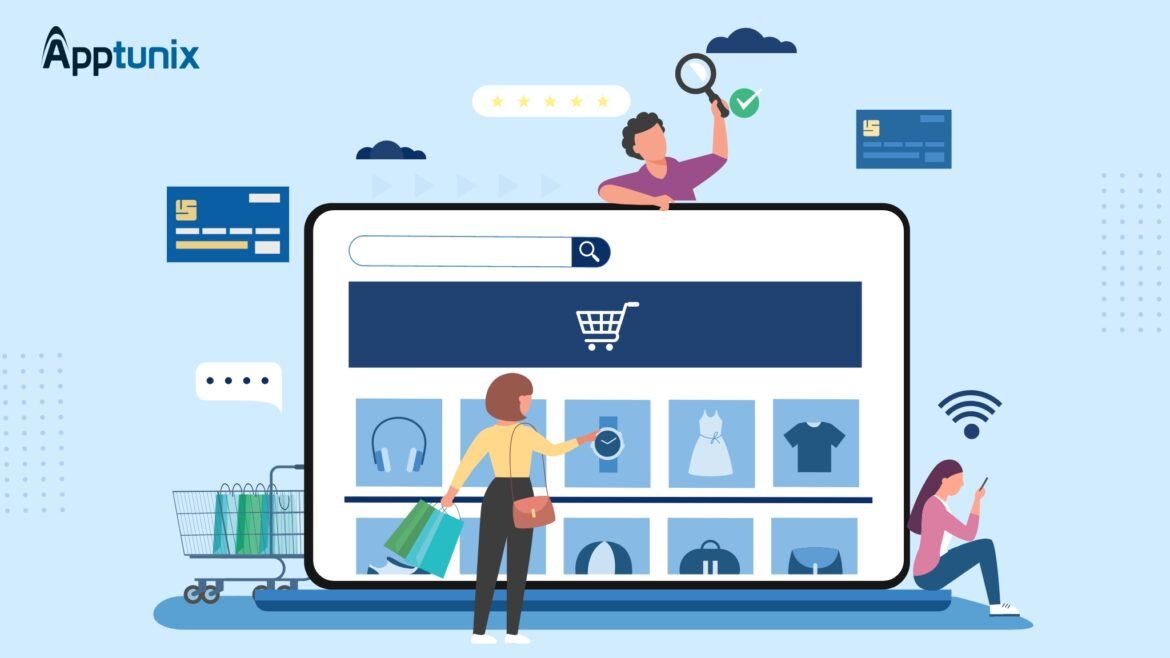
Introduction
Understanding Cloud Computing in E-commerce
In today’s digital age, understanding cloud computing has become crucial for e-commerce businesses aiming to stay competitive. Cloud computing refers to the delivery of various services, like storage, processing, and databases, over the internet, allowing businesses to access resources whenever needed without the requirement for extensive hardware or infrastructure. This flexibility is a game changer for online stores, providing them with the ability to scale operations quickly and efficiently.
Imagine running an e-commerce store during a holiday sale without worrying about server crashes or slow loading times. This is the power of the cloud. It not only enhances operational efficiency but also allows businesses to focus on their core tasks rather than on maintaining IT infrastructure.
Benefits of Implementing Cloud Solutions in Online Stores
The benefits of implementing cloud solutions in e-commerce are extensive. Here are some key advantages:
- Scalability: As sales fluctuate, cloud solutions can adapt to changing demands, ensuring that online stores remain operational during peak times.
- Cost Reduction: Traditional servers can be expensive. Moving to the cloud often leads to significant savings in infrastructure and maintenance costs.
- Improved Collaboration: Teams can access and work on data in real-time from anywhere, enhancing productivity and faster decision-making.
- Enhanced Security: Though concerns about data security exist, many cloud providers offer advanced security measures and compliance standards that can surpass typical in-house capabilities.
By integrating cloud computing into their operations, online retailers can not only streamline processes but also improve the shopping experience for their customers, presenting a compelling case for this technological shift.
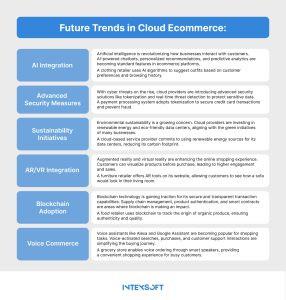
Cloud Computing Fundamentals
Definition and Types of Cloud Computing Services
Understanding the core definitions and types of cloud computing services is essential for e-commerce businesses to leverage this transformative technology effectively. At its heart, cloud computing provides on-demand access to a shared pool of configurable computing resources—everything from servers, storage, and databases to networking, software, and analytics.
Cloud services are generally divided into three primary models:
- Infrastructure as a Service (IaaS): This service offers fundamental computing resources like virtual servers and storage solutions. It’s perfect for businesses that need flexibility and control over their infrastructure without the costs associated with physical servers.
- Platform as a Service (PaaS): Here, users can develop, run, and manage applications without dealing with the complexity of building and maintaining the infrastructure typically associated with developing and launching apps.
- Software as a Service (SaaS): This model delivers software applications over the internet, on a subscription basis. Think about email services or online office tools, which exemplify how SaaS eases daily operations for e-commerce users.
Importance of Cloud Security in E-commerce
As e-commerce continues to flourish online, cloud security becomes a pivotal concern. Security breaches not only jeopardize customer data but can also damage a brand’s reputation and trust.
Cloud security encompasses various protocols and technologies designed to safeguard data hosted in the cloud. It’s crucial for e-commerce companies to ensure that they adopt platforms offering:
- Data Encryption: Protects sensitive transactions and user information.
- Multi-factor Authentication: Adds an additional layer of security by requiring users to provide two or more verification factors.
- Regular Security Updates: Keeping systems up-to-date is vital to ward off vulnerabilities.
Imagine handling sensitive customer information like credit card details—any breach could lead to significant losses. Therefore, investing in robust cloud security measures not only protects data but also strengthens customer confidence, ultimately contributing to the long-term success of e-commerce businesses.
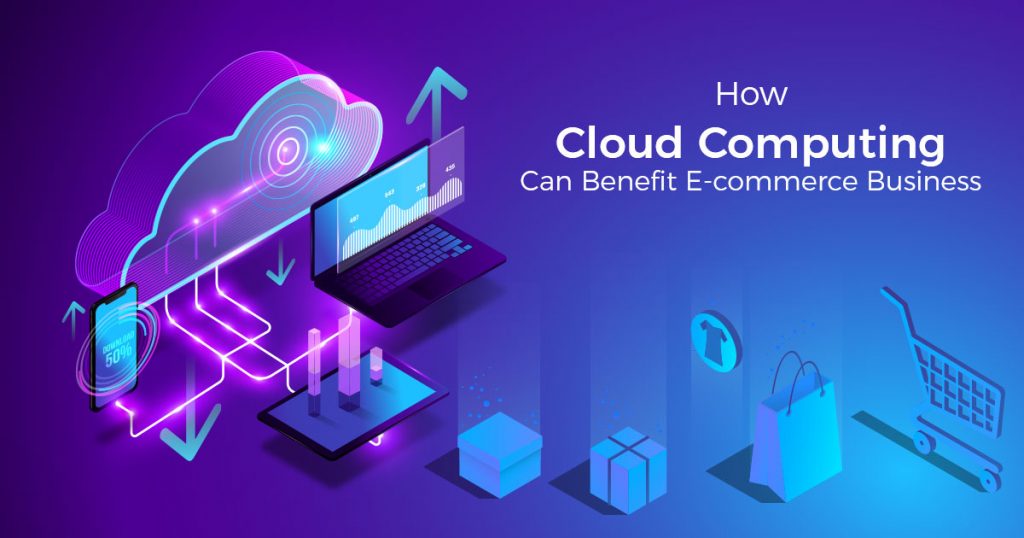
Implementing Cloud Solutions in Online Stores
Migration to the Cloud for E-commerce
After understanding the foundational principles of cloud computing, the next step for e-commerce businesses is to consider migration to the cloud. Transitioning from traditional infrastructure to cloud-based solutions might seem daunting, but the payoff can be significant.
One effective approach is to assess current business processes and identify areas that would benefit most from cloud solutions. Key steps in the migration process typically include:
- Assessment: Evaluate existing systems for compatibility with cloud technologies.
- Planning: Draft a comprehensive migration plan covering timelines and resource allocation.
- Pilot Testing: Start small; migrate a single function or application to ensure functionality before a full-scale transition.
- Full Migration: Implement the migration comprehensively, training employees for smooth adaptation.
Many e-commerce businesses have successfully undergone this migration phase. For instance, a niche fashion retailer was able to improve website speed and customer engagement significantly by migrating its inventory management system to the cloud.
Cloud-based Tools for E-commerce Optimization
Once migrated, online stores can capitalize on a plethora of cloud-based tools designed for operational optimization. These tools can not only improve efficiency but can also enhance user experiences.
Some effective cloud-based solutions include:
- Customer Relationship Management (CRM): Tools like Salesforce empower retailers to manage customer interactions and data seamlessly.
- Inventory Management Systems: Solutions like TradeGecko help streamline inventory processes, ensuring stock levels are optimal.
- Analytics Platforms: Google Analytics provides valuable insights that aid in tailoring marketing strategies effectively.
Investing in these tools allows e-commerce businesses to remain agile and responsive to changing market conditions. By leveraging the strengths of cloud-based technology, retailers can not only enhance operational efficiencies but also create an unparalleled shopping experience that keeps customers coming back.

Advantages of Cloud Computing in E-commerce
Scalability and Flexibility
As e-commerce businesses continue to grow, the need for scalability and flexibility becomes increasingly apparent. One of the standout advantages of cloud computing is its inherent ability to scale resources up or down based on immediate needs. This capability can be invaluable during peak sales periods or promotional events.
Consider a seasonal online retail store that experiences significant traffic spikes during the holiday season. With cloud computing, they can easily increase their server capacity to handle the additional load without investing in permanent infrastructure. Once the rush subsides, they can scale back, only paying for what they actually use.
The flexibility of cloud solutions also allows businesses to adapt quickly to changing customer preferences and market conditions. This responsiveness can be the difference between retaining a loyal customer and losing them to a competitor.
Cost Efficiency and Resource Optimization
In an increasingly competitive landscape, cost efficiency is a top priority for e-commerce businesses. Cloud computing delivers this advantage by eliminating the need for large capital expenditures on hardware and infrastructure.
Instead of purchasing and maintaining expensive servers, companies can take advantage of a pay-as-you-go model. This approach enables businesses to:
- Reduce Operational Costs: Lower IT costs mean that funds can be redirected toward marketing, product development, or customer service enhancements.
- Optimize Resources: Businesses can focus on leveraging and optimizing their core competencies rather than getting bogged down with IT challenges.
For example, an online bookstore saw significant savings after migrating to cloud services. By outsourcing their hosting to a cloud provider, they were able to redirect their savings toward expanding their book collection and improving shipping speeds.
In conclusion, the advantages of cloud computing—scalability, flexibility, cost efficiency, and resource optimization—are transformative for e-commerce businesses. Embracing this technology can foster growth and innovation, positioning retailers for long-term success.
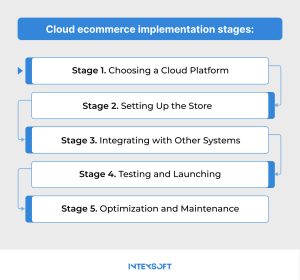
Challenges and Considerations
Data Security and Compliance
While cloud computing offers numerous benefits for e-commerce businesses, it’s essential to address the challenges that come with it, particularly in data security and compliance. The very nature of e-commerce involves handling sensitive customer information such as payment details, addresses, and detailed purchase histories.
This places a significant responsibility on businesses to ensure that data remains secure. Here are some key considerations:
- Understanding Regulations: Compliance with regulations, such as GDPR or PCI-DSS, is crucial. These frameworks dictate how personal data must be handled and protected.
- Choosing the Right Provider: Not all cloud service providers offer the same level of security. It’s vital to select one that incorporates strong encryption, data protection strategies, and compliance measures.
- Regular Audits: Periodic reviews of security practices can help identify vulnerabilities and ensure that compliance standards are being met.
For example, a burgeoning e-commerce startup recently faced challenges due to inadequate data protection measures, resulting in a data breach that tarnished their reputation. This incident serves as a stark reminder of the importance of prioritizing data security.
Integration with Existing Systems
Another challenge businesses must navigate is the integration of cloud solutions with their existing systems. Transitioning to the cloud doesn’t happen in a vacuum; it requires ensuring that new technologies harmonize with legacy systems.
Here are some strategies to facilitate this integration:
- Conducting a Detailed Systems Analysis: It’s essential to understand how existing systems operate and identify areas where cloud solutions can be seamlessly integrated.
- Choosing Compatible Cloud Tools: Opt for cloud-based applications that are compatible with existing software to avoid bottlenecks during implementation.
- Investing in Training: Providing staff with the necessary training ensures that they can effectively utilize new tools, minimizing resistance to change.
A small electronics retailer faced hiccups during their cloud migration because their previous systems weren’t adequately compatible. By taking time to map out their integration strategy, they successfully streamlined operations and reduced downtime.
In summary, while the transition to cloud-based solutions in e-commerce is laden with challenges, addressing data security and ensuring smooth integration with existing systems can pave the way for a more secure and efficient online business environment.
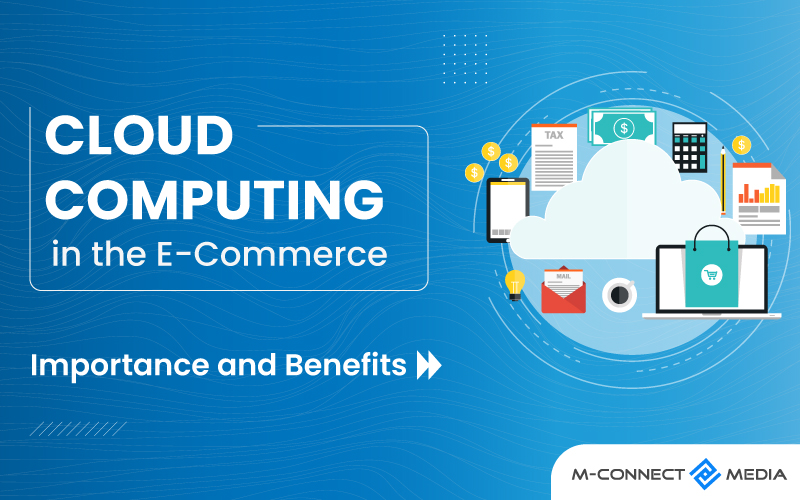
Case Studies: Successful Implementation
E-commerce Brands Leveraging Cloud Computing
As more e-commerce businesses recognize the potential of cloud computing, several have successfully transformed their operations by embracing this technology. Notable brands exemplifying this shift illustrate how cloud solutions can bolster efficiency and innovation.
For instance, Zalando, a leading online fashion retailer, migrated to the cloud to enhance its customer experience. By utilizing Amazon Web Services (AWS), Zalando improved its site speed and reliability, particularly during high-traffic periods. The cloud allowed them to automatically scale resources, ensuring that their infrastructure could handle surges in web traffic, especially during sales events without compromising performance.
Another example is Shopify, which provides a platform for small to medium-sized businesses to establish their online stores. By harnessing cloud technology, Shopify enables its users to manage inventory, sales, and customer relationships seamlessly. This has allowed countless businesses to flourish without worrying about back-end infrastructure.
Impact of Cloud Integration on Business Growth
The impact of cloud integration on business growth can be profound. Companies that leverage cloud solutions often witness improved operational efficiencies and enhanced customer satisfaction.
Consider the case of Warby Parker, an online eyewear retailer. By integrating cloud-based analytics tools, they gained valuable insights into customer preferences and purchasing behavior. This strategic move enabled them to offer personalized marketing and streamlined inventory management, resulting in a notable increase in sales.
Some measurable impacts of cloud integration include:
- Faster Time to Market: Businesses are able to launch new products and services significantly faster.
- Expanded Geographic Reach: With cloud solutions, brands can efficiently manage operations across different regions without the need for complex physical infrastructures.
- Enhanced Customer Engagement: Personalized experiences lead to better customer retention, as businesses can respond swiftly to customer needs.
In summary, successful e-commerce brands are harnessing the power of cloud computing to promote growth and operational excellence. By embracing these technologies, they not only enhance customer experiences but also position themselves for sustained success in an increasingly competitive landscape.

Future Trends in Cloud Computing for E-commerce
Innovations and Emerging Technologies
As we look toward the future, the landscape of cloud computing for e-commerce is ripe with innovations and emerging technologies that promise to reshape how online businesses operate. Artificial Intelligence (AI) and Machine Learning (ML) are at the forefront of this transformation. By leveraging cloud-based AI tools, e-commerce businesses can analyze customer data in real-time, enabling personalized recommendations and targeted marketing.
For example, companies like Nike utilize cloud-powered AI to tailor their marketing strategies based on customer behavior and preferences. This not only enhances shopping experiences but also boosts conversion rates.
Moreover, the rise of Blockchain technology offers exciting possibilities for enhancing transaction security and transparency. By using cloud-based blockchain solutions, e-commerce platforms can facilitate secure payments and smart contracts, which could streamline supply chain operations.
Opportunities for Small and Medium E-commerce Businesses
The future also holds vast opportunities for small and medium-sized e-commerce businesses to thrive using cloud computing. These businesses can leverage cost-effective cloud solutions that allow them to compete with larger players without the need for hefty investments in physical infrastructure.
Here are some opportunities for these businesses:
- Affordable Access to Advanced Technologies: Cloud platforms provide access to sophisticated tools for data analytics, customer relationship management, and inventory management at a fraction of traditional costs.
- Increased Agility: Smaller e-commerce companies can quickly adapt to market changes, launch new products, or pivot strategies without being weighed down by legacy systems.
- Collaborative Tools: Cloud-based collaboration has never been easier, allowing remote teams to work efficiently and maintain productivity regardless of their location.
For instance, a small artisanal goods shop that shifts to cloud-based inventory management can optimize stock levels, reduce overheads, and respond more swiftly to customer demand fluctuations.
In conclusion, as cloud computing continues to evolve, e-commerce businesses—regardless of their size—have exceptional opportunities to innovate, streamline operations, and meet the ever-changing needs of consumers. Embracing these future trends could be the key to standing out in a crowded marketplace.
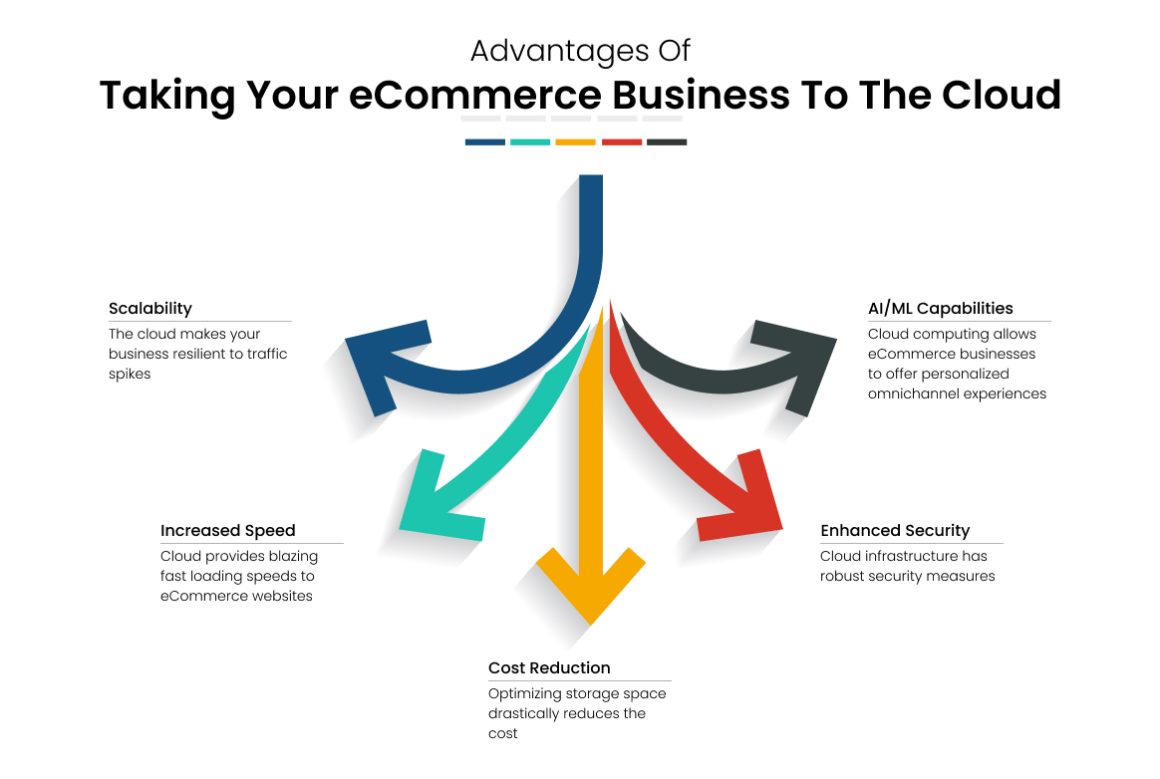
Conclusion
Recap of Benefits and Challenges
As we’ve explored throughout this article, cloud computing represents a transformative force in the e-commerce landscape, bringing both remarkable benefits and notable challenges. The advantages are clear: scalability, flexibility, cost efficiency, and access to advanced technologies empower businesses to operate more effectively and respond to market demands rapidly. Companies like Zalando and Warby Parker have reaped the rewards of integrating cloud solutions into their operations.
However, the journey to the cloud is not without its obstacles. Data security and compliance remain significant concerns, as the responsibility for safeguarding sensitive information rests firmly on the shoulders of e-commerce businesses. Moreover, integrating new cloud solutions with existing systems can sometimes lead to complications if not approached strategically.
Recommendations for Effective Cloud Adoption
To navigate these complexities successfully, here are some practical recommendations for e-commerce businesses considering cloud adoption:
- Conduct a Comprehensive Needs Assessment: Before jumping into the cloud, understanding your specific operational requirements is key. Identify which processes will benefit most from cloud solutions.
- Choose the Right Providers: Not all cloud service providers offer the same security features and customization options. Research extensively to partner with one that meets your specific needs.
- Establish Clear Compliance Protocols: Address data security proactively by establishing strict compliance measures and conducting regular audits.
- Invest in Training: Equip your team with the necessary skills to utilize new cloud solutions effectively. A well-trained team is crucial for maximizing the benefits of cloud technology.
By keeping these recommendations in mind, e-commerce businesses can position themselves for growth and success in a digital marketplace increasingly driven by cloud computing. Embracing this technology not only enhances operational efficiencies but also opens doors to innovation and improved customer satisfaction. The future of e-commerce is indeed bright with cloud solutions at the forefront.
